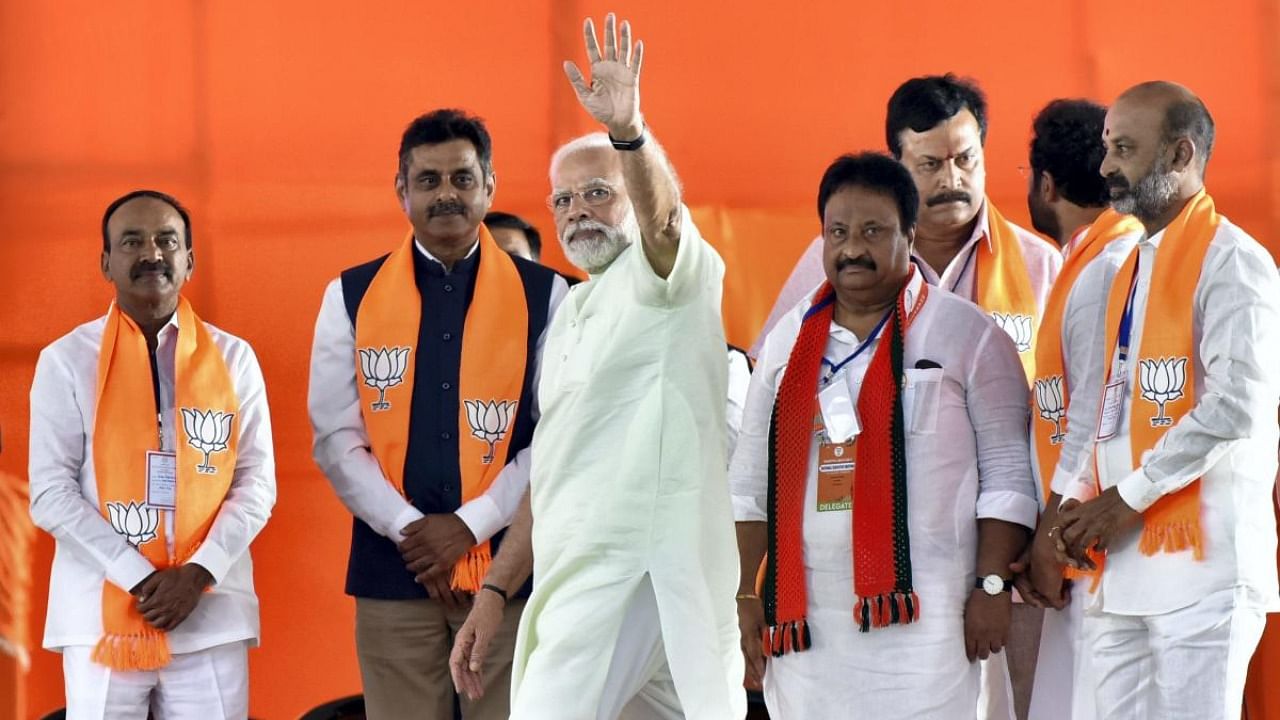
The entire BJP top brass descended on Hyderabad on July 3 for a two-day meeting of its National Executive.
The choice of Hyderabad, capital of Telangana, was no doubt to send a message to the well-entrenched K Chandrasekhar Rao government that the BJP wants to be a serious player in the state, which is heading to polls next year.
Leaders feasted on sumptuous local delicacies and brainstormed.
Later, the party boldly predicted that it will form governments across the south in future. Not just that. The BJP will also uproot family-run parties in the region.
The claim would have been laughed off had it come from another party, but with the BJP, a peerless election juggernaut, one can never say.
The saffron party has conquered the North, the hilly Northeast but it has enjoyed limited success in the south, with a lone government in Karnataka that was cobbled up with turncoats. The party wants to set this blemish right in its otherwise impressive poll resume.
To achieve this, the party is looking to be ideologically flexible and combine its uncompromising nationalism with local issues to brew a concoction that will resonate with the voters.
It will look to carpet-bomb regions, where it has noticed growing support, with frequent visits of senior leaders to gain traction among locals. State icons will be honoured, local cultural issues will be identified, allowing the state leadership to pursue a somewhat different line on hot button matters like language and cultural identity.
With polarisation not an option and voters not warming up to hardline Hindutva, the party sees this approach as a way out in the south. In its Hyderabad resolution, the BJP hinted that it is ready to adopt changes in its political style to woo moderate voters in southern states and others where minority voters are fewer.
And this makes sense: complex social realities mean that what works in Telangana may not work in Andhra, even though both are Telugu states.
Also, if the party has won a good number of Assembly seats in a particular region, it will contest the related Lok Sabha seat only if it is not held currently by an ally.
"The BJP is turning out to be a tireless election machine, forever keen to expand, win and dominate,” says political analyst Rasheed Kidwai. "Having focused on the east, west and north in the past, southern India is now its focus - Telangana and Karnataka in particular. Be it civic polls or Rajya Sabha nominations from the Presidential quota, eyes on southern expansion remain firmly in place.”
But it is easier said than done as voters in Andhra Pradesh, Kerala and Tamil Nadu have rebuffed the BJP in poll after poll.
In Puducherry, the saffron party tasted some success, but one state that the BJP is betting big on is Telangana. India’s youngest state has been sending positive vibes to saffron politics.
The party won four Lok Sabha seats in Telangana in 2019 and got over 19 per cent votes, a shot in the arm for the party as just six months ago, it had secured a mere 7 per cent of votes and lost in 100 seats in the Assembly polls.
In Andhra Pradesh, the BJP has inflicted a body blow to the TDP, having poached its Rajya Sabha MPs and leaders. But the state has been a difficult nut to crack. In the 2019 Assembly polls, it could not win even a single seat despite contesting 175 seats, and it embarrassed itself in the Lok Sabha polls by scoring a duck out of the 25 seats it contested.
Similarly in Kerala, where the RSS has its pockets of influence, the BJP has not been able to make any headway despite Amit Shah’s ‘Janrakshya Yatra’ and intervention in the Sabarimala row.
In the 2021 Assembly polls, the party lost its only seat Nemom, which was won by O Rajagopal in 2016. And voters derailed ‘Metro Man’ E Sreedharan’s attempt in Palakkad.
The BJP's best showing was in the 2019 Lok Sabha polls, when it secured nearly 16 per cent votes. But within two years the figure declined to 11.3 per cent votes in the 2021 Assembly polls which is also a 5 per cent decline from the 2016 Assembly polls.
In Tamil Nadu, the last year’s Assembly polls came as a huge blow to the BJP. It got less than 2.6 per cent votes, a decline of 1 per cent from the 2016 Assembly polls and nearly a 2 per cent decline from the 2014 Lok Sabha polls when it had won one seat. In the last Lok Sabha polls, the BJP could not win a seat.
So, the BJP's ambition of winning 100 of 205 Lok Sabha seats in southern and coastal states and Shah's Coromandel Corridor plan produced good results in West Bengal and met with partial success in Odisha, but most of the south is still a wall that it hasn’t been able to breach.
The BJP’s collective hope of finding its future growth in south India will be on the test in the coming years, but for now, most of the states remain out of the saffron party's reach.
